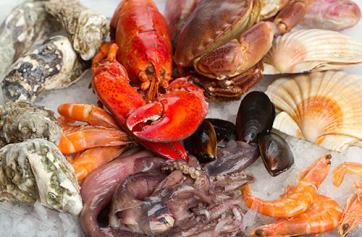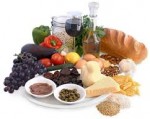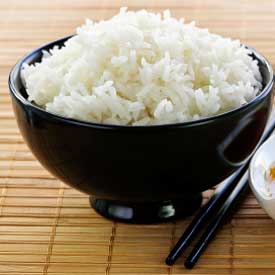 It is generally accepted that it is a good idea to include fish, such as salmon and flounder, that are high in omega-3, in one's diet. But what about shellfish (lobster, crab, mussels, clams, calamari, oysters, scallops etc)? While they contain less omega-3 than fin fish, shellfish are a good source of protein (especially octopus), and if you avoid breading and frying, are low in calories.
It is generally accepted that it is a good idea to include fish, such as salmon and flounder, that are high in omega-3, in one's diet. But what about shellfish (lobster, crab, mussels, clams, calamari, oysters, scallops etc)? While they contain less omega-3 than fin fish, shellfish are a good source of protein (especially octopus), and if you avoid breading and frying, are low in calories.
Other benefits of specific shellfish: Oysters are an excellent source of zinc, clams have iron and Vitamin B-12, and crustaceans are a good source of choline, a nutritient that may be good for memory and muscle control.
But, there are some negatives that shellfish lovers need to consider. Shrimp are high in cholesterol and if you are a 'cholesterol responder' (the cholesterol you eat overly impacts blood cholesterol) you might want to limit your shrimp intake. While we know that large fin fish like sword fish contain mercury, shellfish more readily absorb toxins often associates with the "red tide". Red tide is a bloom of plankton, especially dinoflagellates, that causes an usually reddish discoloration of coastal ocean waters. Certain dinoflagellates produce toxins that contaminate shellfish, making them unsafe to eat, and can kill fish. If you eat shellfish from waters with high concentrations of red tide present, you may risk a case of shellfish poisoning. Symptoms could range from numbness, tingling, headache, dizziness, amenesia, etc. depending on the specific type of toxin ingested. Coastal towns often monitor the presence of red tide and post warnings when the levels are too high for swimming or eating local shellfish and fin fish. This type of tide is more prevalent in warmer, more shallow waters than in cold, deep ocean areas.
Allergies are another concern more prevalent in shellfish. Some people are only allergic to one type of shellfish (crustacean vs. molluscan) or even just one specific shellfish. My mother could not eat oysters and I cannot eat lobster but we both could eat other seafood. Go figure!
Overall, seafood is a good source of many nutrients and a good alternative to more fatty red meats.

 Who doesn't like something sweet like a cupcake? But how much is too much? Our bodies need one type of sugar: glucose! It's an important source of fuel for the body.
Who doesn't like something sweet like a cupcake? But how much is too much? Our bodies need one type of sugar: glucose! It's an important source of fuel for the body. Reasons to try the Mediterranean Diet:
Reasons to try the Mediterranean Diet: The FDA and the EPA are revising their joint fish consumption Advice and Questions & Answers to encourage pregnant women, those who may become pregnant, breastfeeding mothers, and young children to eat more fish and to eat a variety of fish from choices that are lower in mercury. This is a DRAFT for which you may provide comment. Once finalized, it will replace the
The FDA and the EPA are revising their joint fish consumption Advice and Questions & Answers to encourage pregnant women, those who may become pregnant, breastfeeding mothers, and young children to eat more fish and to eat a variety of fish from choices that are lower in mercury. This is a DRAFT for which you may provide comment. Once finalized, it will replace the  The connection between what we eat and mortality rates come as no surprise, but does changing our diet really give us a better chance of survival? According to a study by JAMA International Medicine, there is a correlation between a vegetarian diet and a longer life. However, the study also showed a difference between men and women (25-older). The study took place in the US and Canada over a period of 6 years where the diets of 73,000 participants were observed. This community had even amounts of vegetarians and non-vegetarians. After the span of the 6 years there were a total of 2,570 deaths and the results then provided that participants with a vegetarian diet were 12% less likely to die. The study went in further to this particular statistic and found that the mortality rate was still higher for women despite the fact that they were vegetarian.
The connection between what we eat and mortality rates come as no surprise, but does changing our diet really give us a better chance of survival? According to a study by JAMA International Medicine, there is a correlation between a vegetarian diet and a longer life. However, the study also showed a difference between men and women (25-older). The study took place in the US and Canada over a period of 6 years where the diets of 73,000 participants were observed. This community had even amounts of vegetarians and non-vegetarians. After the span of the 6 years there were a total of 2,570 deaths and the results then provided that participants with a vegetarian diet were 12% less likely to die. The study went in further to this particular statistic and found that the mortality rate was still higher for women despite the fact that they were vegetarian. Using a mobile app that tracks eating and activity helped people lose an average of 15 pounds and keep it off for at least a year, according to a new Northwestern Medicine study. But the technology only aided weight loss when its users also attended regular classes about nutrition and exercise. The app alone didn’t help.
Using a mobile app that tracks eating and activity helped people lose an average of 15 pounds and keep it off for at least a year, according to a new Northwestern Medicine study. But the technology only aided weight loss when its users also attended regular classes about nutrition and exercise. The app alone didn’t help. Consuming a low carbohydrate-high protein diet -- like the Atkins diet -- may be associated with a greater risk of cardiovascular disease in women. Decreases in carbohydrate intake and increases in protein intake were all associated with significantly greater risks of incident cardiovascular disease events in young Swedish women, according to Pagona Lagiou, MD, PhD, of the University of Athens in Greece, and colleagues.
Consuming a low carbohydrate-high protein diet -- like the Atkins diet -- may be associated with a greater risk of cardiovascular disease in women. Decreases in carbohydrate intake and increases in protein intake were all associated with significantly greater risks of incident cardiovascular disease events in young Swedish women, according to Pagona Lagiou, MD, PhD, of the University of Athens in Greece, and colleagues.
 Eating more white rice may increase the risk of type 2 diabetes, especially for Asian populations, Qi Sun, PhD, of Harvard and colleagues reported in the British Medical Journal. Patients who ate the greatest amounts of the grain had a 27% greater risk of developing the disease than those who ate the least, and the relative risk was higher among Asian patients.
Eating more white rice may increase the risk of type 2 diabetes, especially for Asian populations, Qi Sun, PhD, of Harvard and colleagues reported in the British Medical Journal. Patients who ate the greatest amounts of the grain had a 27% greater risk of developing the disease than those who ate the least, and the relative risk was higher among Asian patients. A new simulation model predicts weight changes with varying diets and exercise plans. Researchers at the National Institutes of Health (NIH) have created a mathematical model — and an accompanying online weight simulation tool — of what happens when people of varying weights, diets and exercise habits try to change their weight. The findings challenge the commonly held belief that eating 3,500 fewer calories — or burning them off exercising — will always result in a pound of weight loss.
A new simulation model predicts weight changes with varying diets and exercise plans. Researchers at the National Institutes of Health (NIH) have created a mathematical model — and an accompanying online weight simulation tool — of what happens when people of varying weights, diets and exercise habits try to change their weight. The findings challenge the commonly held belief that eating 3,500 fewer calories — or burning them off exercising — will always result in a pound of weight loss.